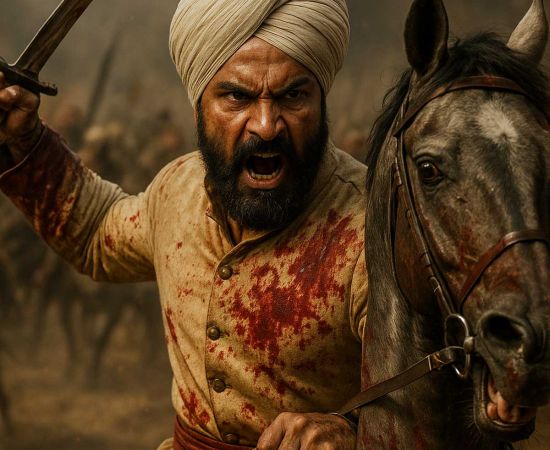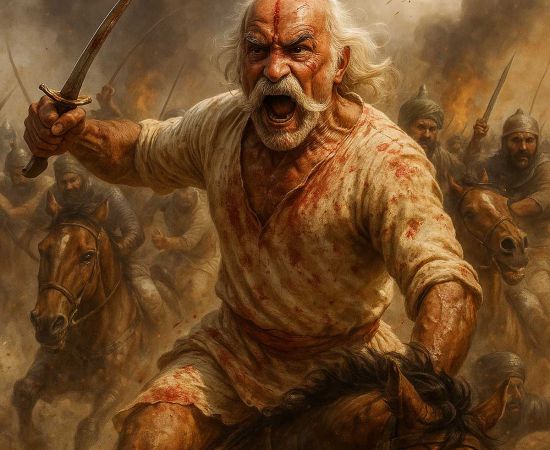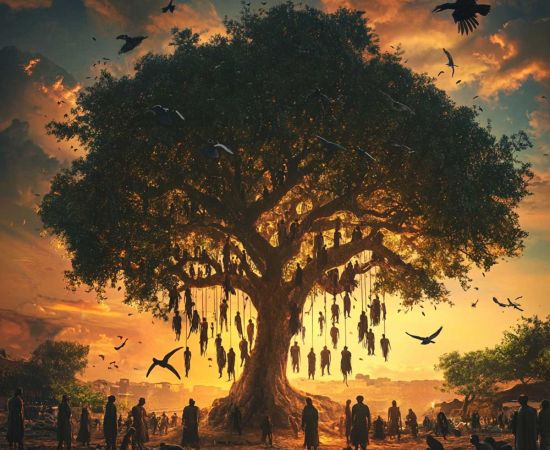MORE COVERAGE
Twitter Coverage
Satyaagrah
Written on
Satyaagrah
Written on
Satyaagrah
Written on
Satyaagrah
Written on
Satyaagrah
Written on
JOIN SATYAAGRAH SOCIAL MEDIA
"मुर्दे हैं तो क्या, उनके जज़्बात नहीं हैं?": Pune's Kondhwa faces turmoil as govt land, once a playground, becomes a Muslim 'Qabristan,' amidst rising tensions, local Hindu residents voice their concerns & objections, sparking a heated community debate
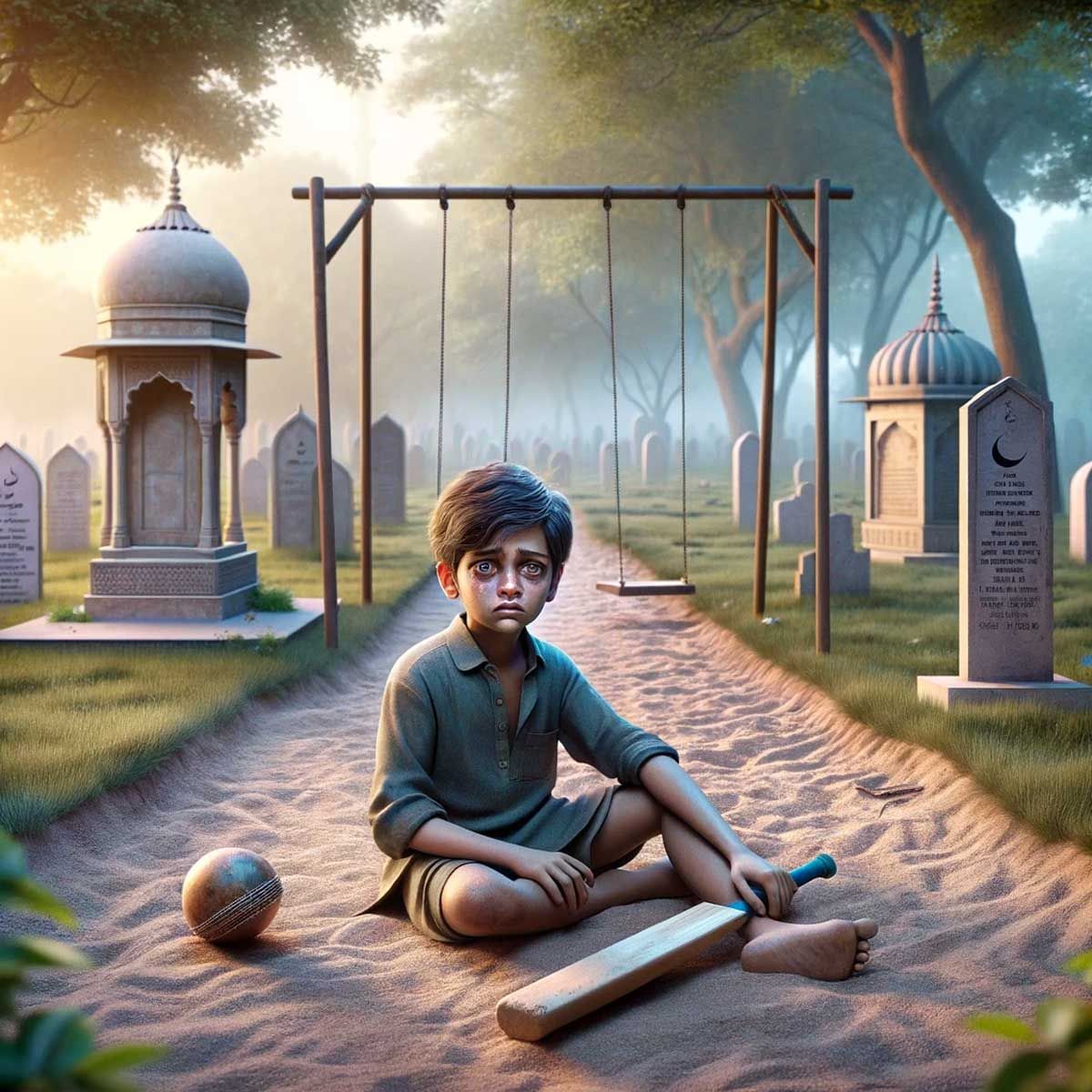
In a surprising turn of events from Pune's Kondhwa region, there has been a significant shift in the use of a piece of government land. Originally designated for the construction of a playground, this land is now being repurposed as a Muslim burial ground, or ‘Qabristan’. This change comes following a proposal by former NCP MLA Chetan Tupe and BJP’s Yogesh Tilekar. They submitted a letter to the Pune Municipal Corporation (PMC), suggesting that the amenity space near Hindu societies in Kondhwa would be an ideal spot for a Muslim burial ground.
|
Their letter emphasized the large Muslim population in the Kondhwa region of Pune. It argued that it would be beneficial for the community to have a burial ground in close proximity. This development has raised concerns among the residents, especially considering the initial purpose of the land.
In the ongoing situation in Pune's Kondhwa region, several Hindu societies located around the designated amenity space (survey no. 44) have raised objections with the Pune Municipal Corporation (PMC). They are contesting the conversion of this space, initially intended for a playground, into a Muslim burial ground.
A notable objection comes from the Raviraj Colorado Co-op Housing Society. Their letter to the PMC states, “The societies around the plot are Hindu societies and several thousand Hindu families reside in this location. Several Hindu temples are also located in the area and building a burial ground for the Muslim community here might cause religious harm to the residents.” This complaint, dated 23rd October, was exclusively obtained by OpIndia, and there has been no response from the PMC on this matter yet.
Further adding to these objections, similar complaints have been lodged by Achalnagar Sahakari Gruharachana Society Ltd and Shree Vardhaman Nagar Co-op Housing Society Ltd. These societies have emphasized to the PMC the presence of about 12,000 to 15,000 Hindu families in the locality. They expressed their disagreement with the decision to allocate amenity space, which was meant to be a playground, for a Muslim burial ground. These additional complaint letters, which have been obtained by OpIndia, bear the signatures of all the society members who are Hindus, indicating a collective stance against the proposed change.
|
In the unfolding situation in Pune's Kondhwa area, the concept of "amenity space" is central to the debate. Amenity space is defined as part of a building or area that enhances convenience for all occupants and is not exclusively used by any single occupant. In this specific case, the amenity space in question is near the societies that have lodged complaints and is under the authority of the Pune Municipal Corporation (PMC).
In the ongoing debate over the proposed Muslim burial ground in Pune's Kondhwa region, Dr. Paritosh Patil, a resident RTI activist, provided further insights while speaking to OpIndia. He clarified his position, emphasizing that the issue is not about opposition to the Muslim community but concerns the location of the burial ground in a densely populated residential area.
Dr. Patil shed light on the status of other potential sites, specifically survey no. 18 and 19, situated in the eastern part of Kondhwa. These areas, he noted, remain vacant and had previously been considered for different uses. “Some people had demanded that a vegetable market should be developed there. However, in the Amenity space committee meeting, the PMC denied the permission. That land can easily be converted into a Muslim burial ground. No problem at all,” he explained. This suggests an alternative solution that could accommodate the needs of the Muslim community without disrupting the existing residential area.
However, Dr. Patil pointed out that the Muslim community members have shown a preference for the survey no. 44 amenity space, which is located in a crowded Hindu locality. According to him, their preference is based on proximity: “They say that it is a closer option for them.” This statement highlights the crux of the contention, where the convenience for one community is weighed against the concerns and existing plans of another in a shared urban space.
|
The controversy dates back to 2021, involving NCP MLA Chetan Tupe Patil. He had proposed to the PMC that the amenity space on survey no. 44 should be converted into a Muslim burial ground, citing the large Muslim population in Kondhwa, Pune. However, the PMC's Amenity Space Committee later suggested that a Muslim burial ground be established on surveys no. 18 and 19, while a playground would be built on survey no. 44.
Despite this, members of the Muslim community expressed a preference for a burial ground on survey no. 44, arguing that it was closer and more convenient. They noted that the proposed site on surveys no. 18 and 19 would create commuting difficulties. Several letters were sent to the PMC advocating for survey no. 44 to be used for the burial ground. These letters, sent by Nagarsevak Adv Abdul Gafar Pathan, Parveen Haji Firoz Sheikh, and former NCP MLA Chetan Tupe Patil, mistakenly claimed that the majority of residents around survey no. 44 were Muslims, making it a suitable location for the burial ground.
In the ongoing case in Pune's Kondhwa region, an additional significant development occurred with BJP’s Yogesh Tilekar's involvement. On 8th May 2023, Tilekar submitted a letter to the Pune Municipal Corporation (PMC), advocating for the establishment of a Muslim burial ground, or Qabristan, on survey no. 44. His letter highlighted that the spaces at survey no. 18 and 19 were too distant from the Muslim locality in Kondhwa, and therefore, using survey no. 44 for the burial ground would be more practical. Subsequently, on 16th May, the PMC approved this proposal based on Tilekar's recommendation.
This decision is documented in a PMC file, which officially authorizes survey no. 44 for the construction of the Muslim burial ground. However, a twist in the story surfaced recently. It was revealed that Tilekar's proposal was influenced by misinformation. He had submitted the letter after being approached by members of the local Muslim community, who conveyed to him that the majority of Muslims lived around survey no. 44. They suggested that this amenity space should be transformed into a burial ground.
Tilekar, upon realizing the broader context and the impact of his proposal, has now changed his stance. He assured that no Muslim burial ground would be established on the land in question, acknowledging the concerns raised by other residents and societies in the area. This recent development adds a new layer to the ongoing dispute, reflecting the complexities involved in decision-making that affects diverse community groups.
In a recent development in the ongoing situation in Pune's Kondhwa region, BJP MLA Yogesh Tilekar spoke to OpIndia, providing clarity on his role in the controversy over the land at survey no. 44. Tilekar acknowledged that he had been misinformed about the space and the ongoing playground construction project on the land. He told OpIndia, “I didn’t know the land was already allotted by the PMC for a playground construction. Neither did the local Muslim representatives tell me nor the PMC. The letter I sent in May 2023 pressed for a burial ground on survey no. 44 space. However, after I learned that the maximum of the population residing around the survey no. 44 space is Hindu, I sent another letter demanding the cancellation of the allotment of the land for a Muslim burial ground.”
Tilekar's subsequent letter to the PMC, dated 23rd October 2023, brought a new perspective to the issue. He stated that the survey no. 44 amenity space is situated in a densely populated area, predominantly inhabited by Hindu residents. The letter explicitly mentioned, “I first thought that the area housed a large Muslim population but I was misinformed. Most of the population residing in the locality is Hindu.” This admission and the ensuing request for cancellation of the burial ground allotment marked a significant shift in Tilekar’s stance, reflecting the complexities and sensitivities involved in managing community spaces in diverse localities.
|
Rs 49 Lakhs Already Spent for Construction of Playground, Space Still Vacant
The ongoing controversy in Pune's Kondhwa over the land at survey no. 44 has taken another turn following revelations from an RTI (Right to Information) query. Dr. Paritosh Zaware Patil, an RTI activist and resident of the Raviraj Colorado Co-op Housing Society located near the contentious land, filed an RTI seeking details about the location. This inquiry uncovered that the Pune Municipal Corporation (PMC) had previously allocated this land for a playground, with the government already spending Rs 43 lakhs on its construction. Despite this significant expenditure, the land remains vacant and has become the center of the dispute regarding the proposed Muslim burial ground.
Further details revealed that the playground's construction was initially sanctioned in 2017. In 2019, a grant of Rs 43 lakhs was secured for this purpose. The construction project was assigned to Salim Construction in the same year, with a total of Rs 49 lakhs eventually being spent. Despite these developments and expenditures, the land is still unutilized.
Dr. Patil expressed concerns about the current state of the land and the proposed change in its use. He stated, “The land is still vacant and no playground has been constructed here. Instead, they want to make a Muslim burial ground here. This is a crowded locality and we don’t want our children to see anything that would not be good for their age.” His statement underscores the community's apprehensions about the proposed burial ground, especially considering the land's original purpose and the financial resources already invested.
Surveys No. 18 and 19 Spaces Stand Vacant
In the evolving discussion about the proposed Muslim burial ground in Pune's Kondhwa region, Dr. Paritosh Patil, an RTI activist, elaborated on the sentiments of the local society members. He made it clear that their concerns are not rooted in any opposition to the Muslim community but are centered around the appropriateness of a burial ground in a densely populated residential area.
Patil clarified, “We are not against the Muslim community. Our problem is the burial ground. How can it be constructed in a densely crowded residential locality? All our society’s flat doors face the ground and families stay with us. What if our children ask tomorrow about the burials? Like what it is and why does this happen? Many children residing in the society are too young to see this.” His comments reflect the community's anxiety about the impact of a burial ground on the residential environment, particularly concerning young children.
Furthermore, he emphasized that their objection would be the same regardless of the community the burial ground was intended for. “Even if there was a demand for Hindu cremation ground, we would have opposed it,” he added. This statement underscores the residents' primary concern: the suitability of having a burial or cremation ground in a residential area heavily populated by families, irrespective of the religious affiliation. The focus remains on the well-being and sensibilities of the residents, particularly the younger ones.
The issue surrounding the land at survey no. 44 in Pune's Kondhwa continues to be a topic of concern for the local residents. The letters submitted by societies near this amenity space highlight the demographic composition of the area. They state, “There are around 12000-15000 Hindu families residing in the locality and hardly any Muslim people stay in the societies. There are also several temples in the area and converting the space into a Muslim burial ground might harm our religious sentiments.”
This statement from the letter underscores the apprehensions of the local Hindu community regarding the proposed transformation of the amenity space into a Muslim burial ground. The residents express concern not only about the demographic incongruity but also about the potential impact on their religious sentiments given the proximity of several temples.
Additionally, the complaint raises health concerns associated with the construction of a burial ground. Dr. Patil, a key figure in this dispute, added further details about these apprehensions. “Water used for the process might seep into the society pipes causing health hazards. The societies and the survey no 44 amenity space are just a wall away from each other,” he confirmed. This proximity raises practical concerns about the implications of having a burial ground adjacent to residential buildings, particularly regarding the potential for water contamination and the close living quarters of the residents. These issues add another layer to the complexities of the situation, highlighting the residents' worries about the impact on their daily lives and well-being.
Hindu Society Members Say They Are Being Threatened, Some Leaving Their Flats
As the controversy over the proposed Muslim burial ground near Pune's survey no. 44 continues, Team OpIndia reached out to residents of nearby societies to understand their perspectives. A resident of Raviraj Colorado society revealed alarming developments following their complaint to the PMC. They shared, “People are threatening us and saying that the inauguration of the burial ground will be executed in January next year. We all are scared and don’t want to see people getting buried there,” as stated by Rupali Shah, a resident.
Rupali Shah further elaborated on the community's response and concerns. She indicated that various Hindu organizations and legal committees are actively examining the issue. The residents, she mentioned, are even prepared to protest if necessary. Highlighting practical challenges, Shah added, “The roadway to the ground is really narrow as the locality is already crowded. Single lanes lead to the ground in question. School buses also pass through the same routes. Imagine now if someone dies from their community (God forbid) and they get the body to the ground for burial and then there’s also a bus passing through the same route.. our children will be forced to see what they should not at this age? Moreover, the traffic issues might also increase. The Muslim burial ground here is a bad idea.”
Shah's comments shed light on the multi-faceted nature of the residents' concerns. Apart from the fear of intimidation, they are worried about the impact on their children and the potential exacerbation of traffic problems in an already congested area. These apprehensions illustrate the broader implications of the burial ground's construction on the community's daily life and mental well-being.
In an ongoing discussion about the amenity space in Pune's Kondhwa, Rupali Shah, a resident of the area, raised additional concerns. She mentioned that the currently vacant space is being misused. When asked about the nature of this misuse, Shah explained that the site has become a spot for drinking and other wrongful activities, particularly in the evening. “This also should stop,” she firmly stated, highlighting the need for action against such activities.
Shah also touched upon a distressing trend among the society members. According to her, the impending establishment of the Muslim burial ground is causing some residents to leave the area. “The Muslim burial ground is making people leave their hard-earned homes. This is not done,” she lamented, expressing the emotional and financial toll the situation is taking on the residents.
Another resident, Jyoti Patil, echoed similar sentiments and concerns. She confirmed the Hindu majority in the Kondhwa region and expressed apprehensions about the potential health risks associated with the proposed burial ground. “The burial ground can result in severe health hazards. Not instantly but in the coming 4-5 years people will notice changes in the environment here and their health to be specific. This is hazardous. Also, this is a Hindu community crowded space. Religiously, it would be incorrect to have another community burial ground here. Strict action should be taken in this case,” Patil stated.
Her comments underscore the residents' fears about long-term environmental and health impacts, as well as the religious and cultural implications of having a burial ground for a different community in a predominantly Hindu area. The residents’ calls for strict action reflect their deep concerns about the future of their community and the need for thoughtful consideration of the site's usage.
The situation regarding the land at survey no. 44 in Pune's Kondhwa continues to develop. The Pune Municipal Corporation (PMC) initially took action based on a letter submitted by BJP’s Yogesh Tilekar advocating for a Muslim burial ground on the site. However, Tilekar later stated that he was misinformed about the location and is now actively seeking to prevent the conversion of the playground into a burial ground. Despite his efforts, including a formal cancellation request, the Amenity Space Committee of the PMC has yet to take any action. The decision is expected to be discussed in the upcoming meeting of the committee.
Currently, the amenity space includes a jogging track and a few rest places, while a significant portion of the land remains unused.
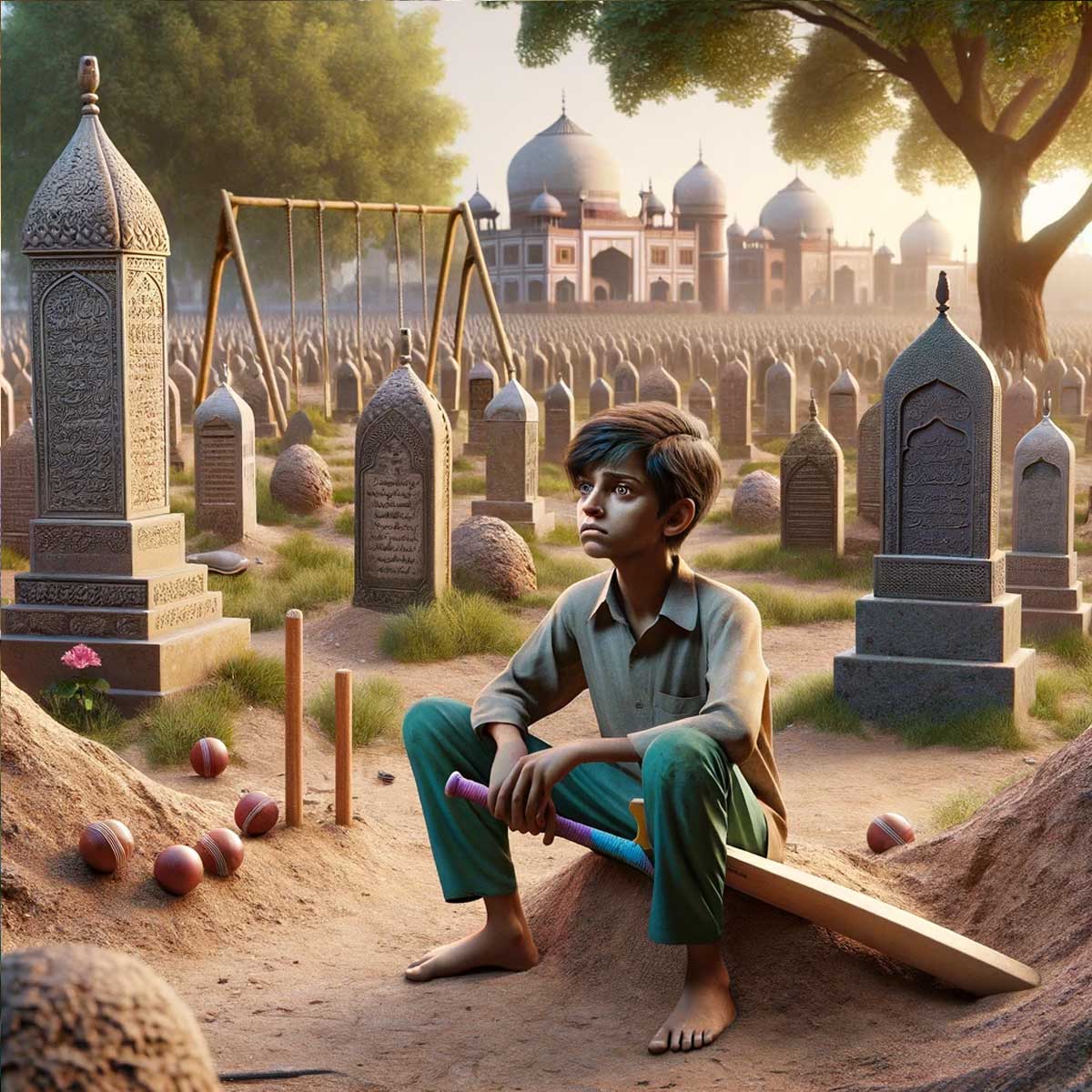 |
Kondhwa Region in Pune Has Been the Hub of Pune ISIS Module
It is also important to acknowledge that Pune's Kondhwa region has been in the news for reasons unrelated to the land dispute. In July of this year, the National Investigation Agency (NIA) arrested a doctor from the Kondhwa region for allegedly sheltering members of ISIS, a globally recognized terrorist organization. Additionally, three residents from the Mithanagar area in Kondhwa were arrested by the NIA for allegedly promoting terrorist activities linked to the Islamic State (IS). This background adds a complex layer to the ongoing discussions and decisions about land use in the area.
In August, further developments emerged in the Kondhwa region of Pune, related to ISIS activities. It was revealed that accused ISIS operatives had been involved in organizing and participating in bomb-making workshops in the area in 2022. The central investigation agency had gathered credible intelligence indicating that these individuals and their associates were actively involved in recruiting youth. They were reportedly training them to construct Improvised Explosive Devices (IEDs) and to manufacture weapons. The operatives were also sharing Do It Yourself (DIY) kits and materials necessary for creating IEDs and making small arms, including pistols.
Additionally, these accused individuals were implicated in creating content for the pro-ISIS magazine 'Voice of Hind'. This online magazine was linked to multiple raids conducted by the National Investigation Agency (NIA) in October 2021 in Kashmir.
On 5th August, the accused were taken into custody by the Anti-Terrorism Squad (ATS) following a court order in Pune. During their investigation, the ATS uncovered incriminating materials from the accused. This included an Indian map with several cities marked, laptops containing information on the modus operandi of terror attacks, and more. Initially, it was believed that their activities were linked to the Al Sufa module. However, subsequent investigations confirmed their association with ISIS.
 Support Us
Support Us
Satyagraha was born from the heart of our land, with an undying aim to unveil the true essence of Bharat. It seeks to illuminate the hidden tales of our valiant freedom fighters and the rich chronicles that haven't yet sung their complete melody in the mainstream.
While platforms like NDTV and 'The Wire' effortlessly garner funds under the banner of safeguarding democracy, we at Satyagraha walk a different path. Our strength and resonance come from you. In this journey to weave a stronger Bharat, every little contribution amplifies our voice. Let's come together, contribute as you can, and champion the true spirit of our nation.
 |  |  |
| ICICI Bank of Satyaagrah | Razorpay Bank of Satyaagrah | PayPal Bank of Satyaagrah - For International Payments |
If all above doesn't work, then try the LINK below:
Please share the article on other platforms
DISCLAIMER: The author is solely responsible for the views expressed in this article. The author carries the responsibility for citing and/or licensing of images utilized within the text. The website also frequently uses non-commercial images for representational purposes only in line with the article. We are not responsible for the authenticity of such images. If some images have a copyright issue, we request the person/entity to contact us at This email address is being protected from spambots. You need JavaScript enabled to view it. and we will take the necessary actions to resolve the issue.
Related Articles
- Greece bans Halal slaughter for being inhumane
- Know about five Hindu women who join forces to move the Varanasi court for seeking an unrestrained right to worship Maa Shringar Gauri inside the disputed Gyanvapi structure and barring opponents from harming the statues inside
- Public grounds in Gurugram are ‘Muslim sites’ as per Guardian: Muslims have right to offer namaz at those places
- "Dissidents in Saudi Arabia, Israel and India are languishing in Jails and USA is the biggest ally of these tyrants": Elle India publisher Arif Ayyub suffers a meltdown, wants Muslim nations to join military forces against Saudi, UAE and attack Israel
- From joining ‘farmers’ protest to converting Rohingyas for Indian citizenship: How Christian groups have exploited the pandemic
- Lab manager Aslam from Areekkara was caught spying on women with a hidden camera in a Kuttiady hostel bathroom—locals beat him up, cops arrested him, and Kerala exploded in anger as CCTV proved it wasn’t a mistake but a dirty, planned act
- "ठाएं ठाएं": Sarfaraz & Talib, the ruthless killers of Hindu man Ram Gopal Mishra during the blood-soaked Bahraich Durga Puja violence gunned down by police while desperately fleeing to Nepal; now both lie in hospital, awaiting the full weight of justice
- "It is customers’ right": Declares Ujjain Mayor Mukesh Tatwal, mandating all shops display owners' names and phone numbers prominently, inspired by similar directives from the Uttar Pradesh and Uttarakhand governments for the Kanwar Yatra route
- “Kashmir to bas jhanki hai, poora Bharat baaki hai” and “Brahman teri kabr khudegi BHU ki dharti par” anti-Hindu hate slogans surfaced on BHU campus after VC Sudhir Jain attended Iftar Party: Furious students burn VC’s effigy
- 'Have more children and that is how we grab power' says AIMIM leader while inciting Muslims: Viral video
- "एक और": In Agra, Faeem Qureshi sentenced to 10 years for dowry death under IPC 304B after Varsha, harassed for ₹5 lakh, a car, and religious conversion, was found dead; her family alleged murder, but his in-laws acquitted for lack of evidence
- 'Found stone carvings of Hindu Gods-Goddesses, lotus, Seshnaag, Shrigar Gauri shrine distinctly visible, absolute remnants of ancient Hindu temple': Survey commissioner Ajay Mishra reports, Muslim side continuously uncooperative
- Hitler’s propaganda minister Joseph Goebbels said 'Repeat a lie often enough and it becomes the truth' - Whitewashing a genocide – how the exodus of Kashmiri Pandits is being blamed on Hindus instead of on Islamists
- Neeraj Prajapati, part of the pro-CAA tricolour march in Jharkhand was killed by a frenzied Muslim mob with an iron rod: Two years later his family still awaits justice
- "ता-क़यामत कर्बला": 9 Bangladeshi women, arrested for illegal stay in India along with a local woman who sheltered them, highlighting the rising Islamization and violent crimes, including the drugging, kidnapping, torture, and rape of Hindu girls by them




















